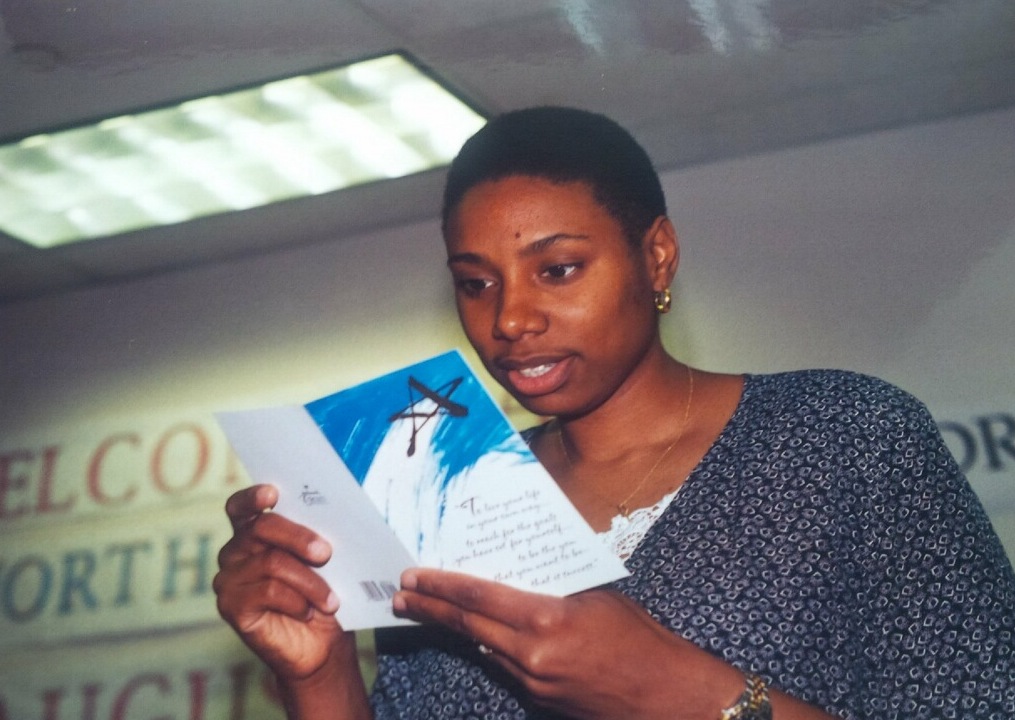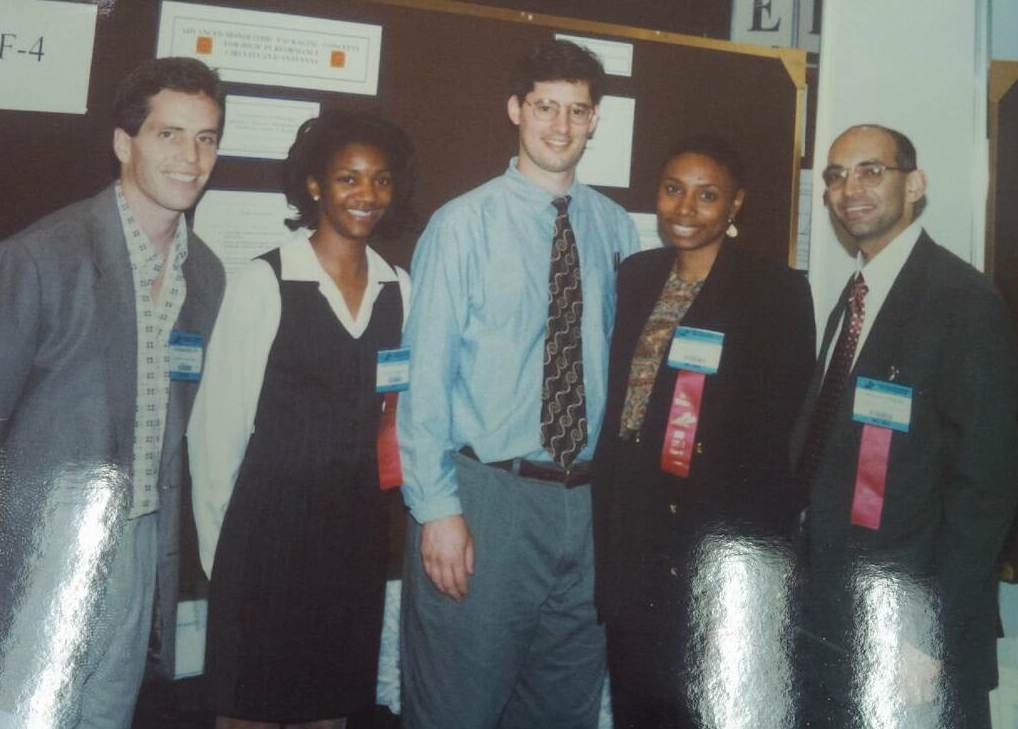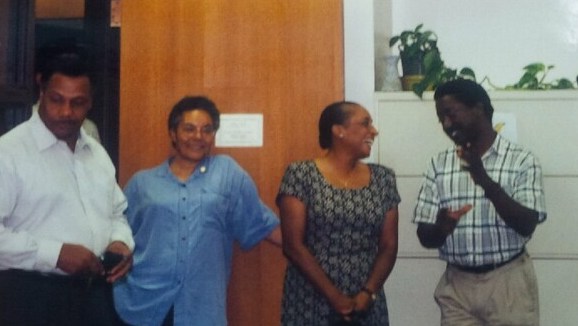Rhonda Franklin receives ECE Distinguished Alumni Educator Award
Rhonda Franklin (MS PhD EE 1990 1995), McKnight Presidential Professor of Electrical Engineering in the Department of Electrical and Computer Engineering, and Abbott Professor of Innovative Education in the Institute for Engineering in Medicine at the University of Minnesota, was recently recognized for her exceptional contributions to engineering education through the ECE Distinguished Alumni Educator Award.
We are the sum of our experiences.
She returned to the University of Michigan on February 2, 2024 to give her award lecture, entitled, “Sensing & Interconnect Technologies for Diverse Applications – Communications, Ecology, and Nanomedicine.”
Franklin began her award lecture with a familiar childhood quote from her mother: “We are the sum of our experiences.” Throughout her presentation, she explained how each of her opportunities built on the experiences that came before––even if she didn’t realize it at the time.
Franklin grew up in Houston, Texas, home to NASA’s Johnson Space Center. She pursued a bachelor’s degree in Electrical Engineering from Texas A&M and has had several internships in the energy industry. From a College of Engineering visitor, Dr. Howard G. Adams, she learned about the GEM Fellowship Program. Adams was the executive director of this program, which supports underrepresented students to get their master’s degrees, while also partnering them with a company. She received a fellowship and joined Lawrence Livermore National Laboratory in California, where she learned not only about research, but how to get out of hauling around heavy power electronic devices.
“The Director of Engineering said, ‘why don’t you go up in frequency. Then you can do everything yourself,’” she recalled.
That was perfect for Franklin, who became initiated into the world of RF and microwave frequencies and their applications.
“I wish I could tell you that I had it all figured out and I just knew I wanted to do RF, but that’s not how it went––it [my career] was very evolutionary and I used each of the experiences that I had to inform the decisions for the next one,” Franklin said.
When it came time to select a school for graduate study, Michigan rose to the top of the list. She joined Prof. Linda Katehi’s group in the Radiation Lab (Radlab), and stayed to get her PhD. Her work with Katehi inspired not only her future research directions, but her desire to develop and mentor her own diverse research group.
“If you believe diversity is going to give you better outcomes then you have to teach people how to do it,” said Franklin in an earlier interview. “Prof. Katehi taught us to be highly productive within a diverse group… We were all very, very different. But we could be whatever we were and somehow she could see how to manage us and lead us in a way that we could be very productive and successful without ever having to not be who we were.”

Franklin’s own diverse research group at the University of Minnesota focuses on microwave packaging and circuit technology for communications systems, sustainable ecology, biomedical applications, and most recently, security.
She and one of her graduate students, Aditya Dave, are developing and comparing antennas packaged for applications such as autonomous drones to communicate with satellites and ground systems like cell towers. They were able to design an antenna that is lightweight, uses minimal power, and has a strong, directional signal, enabling lightweight systems like drones to communicate more efficiently. Their top prototype, which uses a single antenna and a partially-reflective metasurface (PRMS) in place of a 2 x 2 slot array of four antennas, also allows them to tune the antenna signal to their needs.
Another graduate student in Franklin’s group, Yali Zhang, is working on optimizing interconnects, which link together elements on a circuit board, using copper nanowires to reduce data loss. These wires are tiny, on the scale of nanometers (thousandths of microns), to replace the larger wires traditionally used as interconnects. A bundle of these smaller wires used as a via can increase the efficiency and accuracy of data transmission in the systems they are used in.
Franklin is also applying her work in the medical sphere to detect disease. With her collaborators at the University of Minnesota, she uses another type of nanowire to detect canine cancer cells. In the future, these magnetic nanowires may be used as minimally-invasive biotags to identify and mark other types of disease cells. Yet another project focuses on the health of trees––using sensors to measure real-time water content in saplings to understand a fungal disease called oak wilt.
These types of projects allow her to use her electrical engineering expertise to help people in a direct and tangible way. As she put it, “I like working with things-for-things but I really wanted to do things-for-people.”
Franklin had some advice for the graduate students attending her lecture. “When you go to a conference, it’s bigger than just the conference and the paper; it’s the community that that conference represents. Those people will become your network for your future.”

For the past 11 years, Franklin has been helping undergraduate and early graduate students to take advantage of networking opportunities through a program called Project Connect, sponsored by the International Microwave Symposium. She founded Project Connect with two other former colleagues at Michigan, Prof. Rashaunda Henderson (MS EE PhD ECE 1994 1999) at the University of Texas at Dallas, and Tom Weller (BS MS PhD EE 1988 1991 1995), Michael and Judith Gaulke Chair in Electrical Engineering and Computer Science at Oregon State University.
“A good percentage of the people who work behind the scenes and support this project are Michigan graduates,” said Franklin, “and it’s been awesome to see us come together many years later to work together on a cause that’s important to all of us.”

Since its inception, Project Connect has mentored nearly 170 students from underrepresented groups, and many of these students have continued to study RF and gone on to pursue graduate school in engineering. [read more about Project Connect]
In recognition of her service to the community and positive influence on a developing a diverse workforce, Franklin received the 2021 IEEE MGA Diversity and Inclusion Award, the 2021 George W. Taylor Award for Distinguished Service, the 2019 IEEE N. Walter Cox Service Award, the 2018 Minnesota African American Heritage Calendar Award, and the 2017 John Tate Advising Award.
Franklin ended her talk on the same note that she began it, by reminding her audience, “What we do reflects who we are and is informed by many things. We really are the sum of our experiences.”
Additional Information
A Q&A with Rhonda Franklin – connecting diverse students
Alumna Rhonda Franklin honored for her accomplishments with the Willie Hobbs Moore Award
 MENU
MENU 
